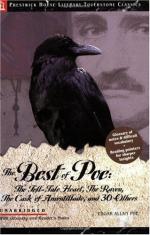It lacks the aerial melody of the poet whose heart-strings are a lute:
“And they say (the starry
choir
And the other listening things)
That Israfeli’s fire
Is owing to that lyre
By which he sits and sings—
The trembling living wire
Of those unusual strings.”
But The Raven, like “The Bells” and “Annabel Lee,” commends itself to the many and the few. I have said elsewhere that Poe’s rarer productions seemed to me “those in which there is the appearance, at least, of spontaneity,—in which he yields to his feelings, while dying falls and cadences most musical, most melancholy, come from him unawares.” This is still my belief; and yet, upon a fresh study of this poem, it impresses me more than at any time since my boyhood. Close acquaintance tells in favor of every true work of art. Induce the man, who neither knows art nor cares for it, to examine some poem or painting, and how soon its force takes hold of him! In fact, he will overrate the relative value of the first good work by which his attention has been fairly caught. The Raven, also, has consistent qualities which even an expert must admire. In no other of its author’s poems is the motive more palpably defined. “The Haunted Palace” is just as definite to the select reader, but Poe scarcely would have taken that subtle allegory for bald analysis. The Raven is wholly occupied with the author’s typical theme—the irretrievable loss of an idolized and beautiful woman; but on other grounds, also, the public instinct is correct in thinking it his representative poem.
A man of genius usually gains a footing with the success of some one effort, and this is not always his greatest. Recognition is the more instant for having been postponed. He does not acquire it, like a miser’s fortune, coin after coin, but “not at all or all in all.” And thus with other ambitions: the courtier, soldier, actor,—whatever their parts,—each counts his triumph from some lucky stroke. Poe’s Raven, despite augury, was for him “the bird that made the breeze to blow.” The poet settled in New-York, in the winter of 1844-’45, finding work upon Willis’s paper, “The Evening Mirror,” and eking out his income by contributions elsewhere. For six years he had been an active writer, and enjoyed a professional reputation; was held in both respect and misdoubt, and was at no loss for his share of the ill-paid journalism of that day. He also had done much of his very best work,—such tales as “Ligeia” and “The Fall of the House of Usher,” (the latter containing that mystical counterpart, in verse, of Elihu Vedder’s “A Lost Mind,”) such analytic feats as “The Gold Bug” and “The Mystery of Marie Roget.” He had made proselytes abroad, and gained a lasting hold upon the French mind. He had learned his own power and weakness, and was at his prime, and not without a certain reputation. But he had written nothing that was on the tongue of everybody. To rare and delicate work some popular touch must be added to capture the general audience of one’s own time.




